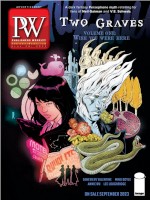Producing a picture book has become a smart career move for comedians these days—a sign that they’re a bona fide cultural force. But Jesús Trejo says the book he’s written was percolating long before he first took to the stage 17 years ago. “I didn’t wake up one day and say, ‘I want to do a book,’ ” he explains. “It’s been a childhood dream. I wanted to bring to the forefront the stories that I lived as a kid.” One story in particular—Trejo’s childhood experience working weekends alongside his father in the family landscaping business—became the basis for his debut, Papá’s Magical Water-Jug Clock (Minerva).
The book is exuberantly funny, but also evocative and eloquent in its depiction of the lives of a Mexican American working-class family. “When he yanks open the rusty sliding door,” Trejo writes of his father’s well-worn business van, “a tasty mixed smell of oil, gasoline, and yesterday’s cut grass comes whooshing out.”
He believes that more picture books should be centered on people like his family, who make their living in essential, labor-intensive jobs and are “invisible” to the rest of their communities. It’s a point of view that’s getting his book plenty of affirmation both at in-person events and on social media. “Yes, it’s a kids’ book,” Trejo says, “and it’s also an American story.”
While Trejo says this book was destined to be, it’s hard not to wonder where he found the time given everything on his plate: in addition to his stand-up career, he acts in multiple television series and produces a web series; he can also be seen in Care to Laugh, a 2018 documentary about being a caretaker for his aging parents. But his book was the proverbial labor of love.
“I love reading and I love writing,” he says. “My whole adult life has been finding the funny in everyday life. This book was just another way to tackle that. Wordplay, similes, metaphor—I could talk about it all day.”
Trejo put together a rough manuscript of the book after finishing up his one-hour special Stay at Home Son, which premiered on Showtime in 2020 and is now streaming on Amazon. His manager, Alex Goodman, connected him to literary agent Albert Lee at UTA. “It ended up being kind of a bidding war, and Minerva won it at auction,” Trejo says, “which was really cool, because they aligned with what I wanted to do creatively.”
The Minerva deal also connected Trejo with editor Maria Russo, whom he praises as “a badass.” Trejo had a list of possible illustrators, but Russo suggested one he wasn’t familiar with: Eliza Kinkz, who is a Tejana. Russo told Trejo that Kinkz’s crayoned style “was as if you were seeing the story through the lens of the kid,” he says.
Russo decided on a double release in English and Spanish (El barrilito mágico de Papá)—a decision that had personal resonance for Trejo. He “basically grew up” in his local library in Long Beach, Calif., he says, because both his parents worked. But he didn’t have full command of English until fifth grade, so his browsing was initially limited to a tiny collection of Spanish-language books housed on a small white bookshelf amid the library’s vast, “midcentury orange” interior. He remembers thinking that the bookshelf “felt like my diving board—I couldn’t swim in the sea of the rest of the library if it wasn’t for the little bookshelf with Spanish titles.”
None of those Spanish titles come to mind today, Trejo says, probably because none were about people with family backgrounds or experiences similar to his. “I was always a really tall kid, so I identified with Clifford the Big Red Dog,” he says with a laugh.
Producing the Spanish edition of Papá’s Magical Water-Jug Clock provided the opportunity for Trejo to collaborate with his partner, Adria Márquez, who served as both a translator and a cultural consultant. “Like, there are so many words in Spanish for grass, which one will we use?” he says. “They’re all correct, but it depends on the context—we were having conversations about regionalism, colloquialism—it was really fun to land where we did.”
Trejo struck a two-book deal with Minerva, and the second title is well underway—this one a tribute to his mother and her love of plants. “I see myself doing comedy and writing kids’ books into old age,” he says.
Libby Morse is a writer and longtime PW contributor.



 Volume 270
Issue 26
06/26/2023
Volume 270
Issue 26
06/26/2023





